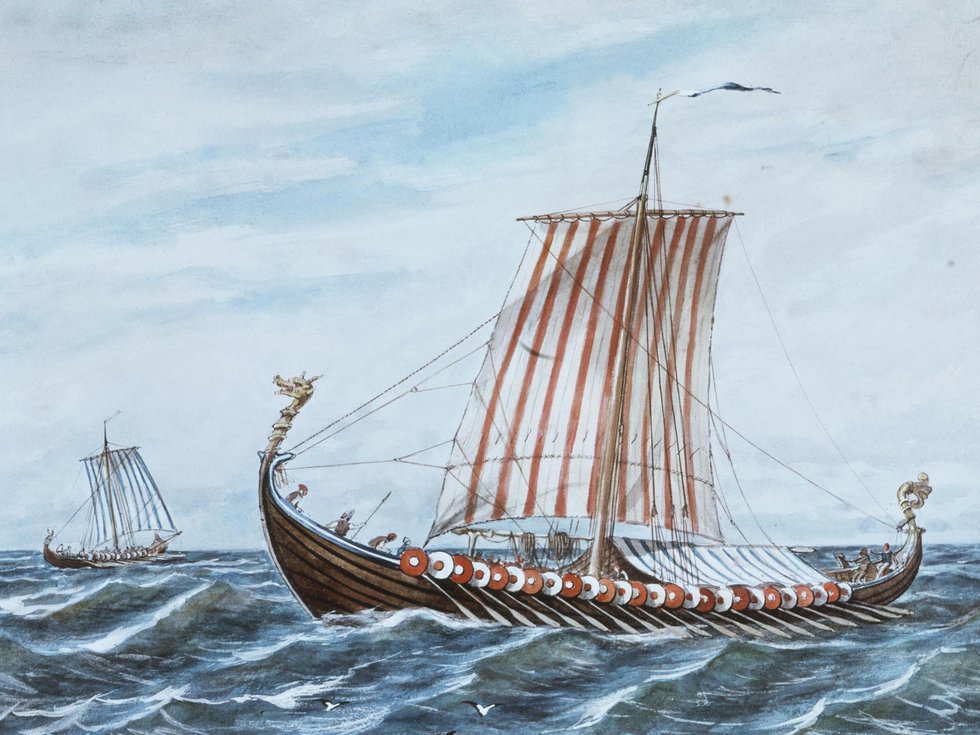Does the blood of those fierce Scandinavian warriors course through your veins?
“Animals die, friends die, and I shall die. One thing never dies, and that is the reputation we leave behind at our death.”
So (apparently) said the Vikings, and, as it happens, they were bang on the money. Because, while it’s been over 900 years since the legendary Scandinavian warriors roamed our shores, we’re still every bit as fascinated with the (admittedly barbaric) raiders and their culture as ever – even if we can’t remember whether or not there’s a great-great-great-great-great-great uncle Olaf hidden somewhere in the branches of our family tree.
Which is why we were so excited to learn that there’s a very easy way to determine whether or not there’s any Viking blood coursing through our veins: take a closer look at our surnames.
Oh yes, a rose by any other name may smell as sweet – but a Scandinavian warrior is all about their moniker.
Experts have said that any surname ending in ‘sen’ or ‘son’ is likely to be of Viking descent (big news for Emma Watson, Emma Thompson, Robert Pattinson and co) – and surnames such as Roger/s, Rogerson, and Rendall also hint that there’s a touch of the marauder to you.
And they aren’t the only surnames that wannabe Vikings should watch out for…
Are you descended from Vikings?
Surnames of Viking descendants
- Names ending in ‘sen’ or ‘son’
- Roger/s, Rogerson, Rendall
- Names which contain a nod to personal characteristics, such as ‘Love’, ‘Short’, ‘Tall’, ‘Wise’, ‘Long’, ‘Good’ (e.g. Goodman).
- Scottish surnames (e.g. McLeod, McIvor, McAvoy, McAulay)
- Irish surnames (e.g. Doyle, McDowell, MacAuliffe)
- Scandinavian surnames (e.g. Flett, Scarth, Linklater, Heddle, Halcro)
The intriguing data was uncovered when TV channel HISTORY teamed up with Alexandra Sanmark from the Centre of Nordic Studies, University of the Highlands and Islands.
Sanmark explained: “The people of the Viking Age did not have family names, but instead used the system of patronymics, where the children were named after their father, or occasionally their mother.
“So, for example the son of Ivar would be given their own first name and then in addition ‘Ivar’s son’. A daughter would be Ivar’s daughter.
“A famous example from a 13th-century Icelandic saga, describing the Viking Age, is Egil Skallagrimsson, who was the son of a man named Skalla-Grim.
“This naming pattern still remains in use in Iceland today but has been abandoned in Scandinavia in favour of family names.”
She added: “People of the Viking Age would often have a descriptive nickname, for example two of the Earls of Orkney who were known as Sigurd the Stout and Thorfill Skullsplitter.”
A spokesman for HISTORY added that, after surveying 2,000 people, they discovered that a whopping 56% of those polled really, really wanted to discover that they had Viking heritage.
“The Viking age is a fascinating period, and a time of which there are many stereotypes and preconceptions,” they said. “It’s really interesting to see just how much awareness there is of the influence the Vikings have had on our world today.”
Sadly, though, HISTORY’s incredible fictional drama Vikings, which is heavily rooted in historical fact, has finally come to an end.
Indeed, the sixth season of the long-running programme (the final 10 episodes of which premiered on 30 December on Amazon Prime) is also its last.
Speaking to Variety, show creator Michael Hirst said: “I always knew where I wanted the show to go and more or less where it would end if I was given the opportunity. What I was trying to do was write the saga of Ragnar Lothbrok and his sons.”
He continued: “After six seasons and 89 episodes, that’s what I felt, finally, I’d done. We stopped shooting the final episode in November [2018] and I felt that I’d said all I needed to say about Ragnar and his sons.”
However, while Vikings is now over and done with, that doesn’t mean that it’s the last time viewers will be able to enter the show’s world.
A sequel spin-off, titled Vikings: Valhalla, is currently being developed for Netflix by Hirst and Die Hard writer Jeb Stuart.
Set 100 years after the end of the original show, the series will feature more famous, real-life Vikings like Erik the Red and Harald Hardrada. “It’s a new kind of heroic age, a very different canvas,” Hirst told EW. “And Jeb Stuart, who’s writing the show, is essentially a thriller writer, so it is going to be different in many ways.”
You can watch Vikings on Amazon Prime now.
This article was originally published in 2019.
Images: Vikings / Sandra Seitamaa / Unsplash
Source: Read Full Article



